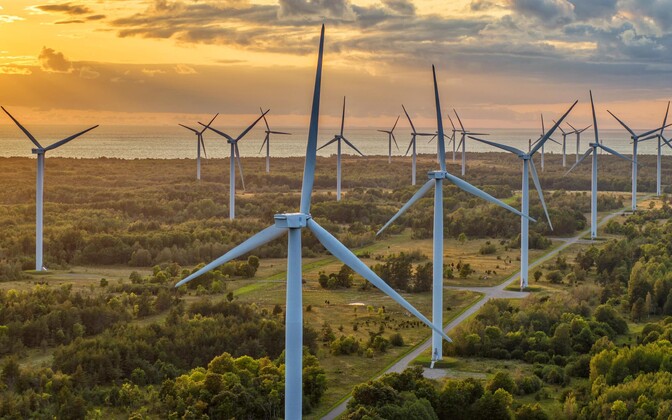Enefit Green believes the terms proposed by the Ministry of Climate for a new renewable energy reverse auction are not attractive enough to encourage participation. Other energy companies interested in the process also see shortcomings.
On July 24, Minister of Energy and the Environment Andres Sutt (Reform) announced a wind energy reverse auction, the terms of which are expected to be approved by the government within a couple of weeks. Prior to that, energy companies had submitted their proposed amendments to the draft, several of which were not taken into account by the Ministry of Climate.
“We expect that within a couple of weeks we’ll receive government approval to organize a reverse auction for one TWh per year, with the option to increase the volume to two TWh annually if there is sufficient interest,” Sutt said at a government press conference.
According to Sutt, the auction criteria will be the same as those used in the previous reverse auction held in 2023: the maximum support rate will be €20 per megawatt-hour and the price cap — the threshold below which support can still be granted — will be €45 per megawatt-hour.
“€45 per megawatt-hour was a very typical electricity price before the energy crisis began,” Sutt emphasized.
Speaking about the potential cost of the reverse auction, the minister said that even if bids totaling two TWh are submitted, the ministry estimates the annual cost will remain within €20 million, though the actual figure could be lower.
But several companies believe that if the state wants more companies to take part in the reverse auction, the terms need to be made more flexible and less risky for businesses, according to the amendment proposals sent to the Ministry of Climate.
A total of five companies submitted recommendations for improving the auction conditions: Utilitas Wind, Enery Estonia, KC Energy, Enefit Green and Eurowind Energy.
Utilitas Wind
Utilitas Wind believes that both the support rate and guaranteed sales revenue should be increased proportionally. Placing cost risks on the winner of the reverse auction could make it unlikely or even impossible to implement the production equipment, the company noted.
“A principle should be added stating that if the state imposes additional costs on the winner after the reverse auction has taken place, the support rate and guaranteed sales revenue should be increased proportionally,” Utilitas Wind explained.
The ministry did not accept the proposal, arguing that market conditions affect all producers equally. Receiving support already creates a more favorable position, it stated.
KC Energy
KC Energy noted that the reverse auction does not support technological neutrality and diversity.
“In KC Energy’s view, limiting reverse auctions in Estonia solely to wind power is not acceptable. Regulatory restrictions based on technology also increase the administrative burden, as technology-specific auctions require a government decision to include a clear impact analysis and justification for deviating from technological neutrality,” the company argued.
The Ministry of Climate did not take the proposal into account, stating that participating in the auction with a hybrid park is not prohibited.
The company also recommended extending the bid submission deadline for reverse auctions until the end of the first quarter of 2026. KC Energy explained that local elections affect the functioning of municipal councils, and forming new councils and getting them to operate effectively takes time. Extending the deadline would give councils sufficient leeway.
KC Energy also requested that the state ensure the possibility to change the location of production units.
“In renewable electricity reverse auctions, location neutrality should be allowed — meaning there should be a possibility to change the location of renewable electricity production units if it becomes clear that developer-independent issues at the original site may prevent the planned unit from being built,” the company wrote.
This proposal was also rejected by the Ministry of Climate, which stated that the location of production units can be changed within 18 months of the directive being issued.
Enefit Green
Enefit Green argued that the method for calculating the sales revenue rate in the reverse auction should be changed.
“We would like to highlight that the rapid increase in the number of negative pricing periods on the day-ahead electricity market reduces the ability of the guaranteed sales revenue rate to mitigate risks for electricity producers, since EU state aid rules do not allow support payments to be made during periods of negative prices based on the difference between the guaranteed rate and the market price,” Enefit Green wrote.
The ministry also rejected this proposal, stating that support payments cannot be granted during hours when the market price is negative, even if the index itself is not yet negative.
In total, companies submitted 22 proposed amendments, of which the ministry accepted five.
—
Follow ERR News on Facebook, Bluesky and X and never miss an update!
